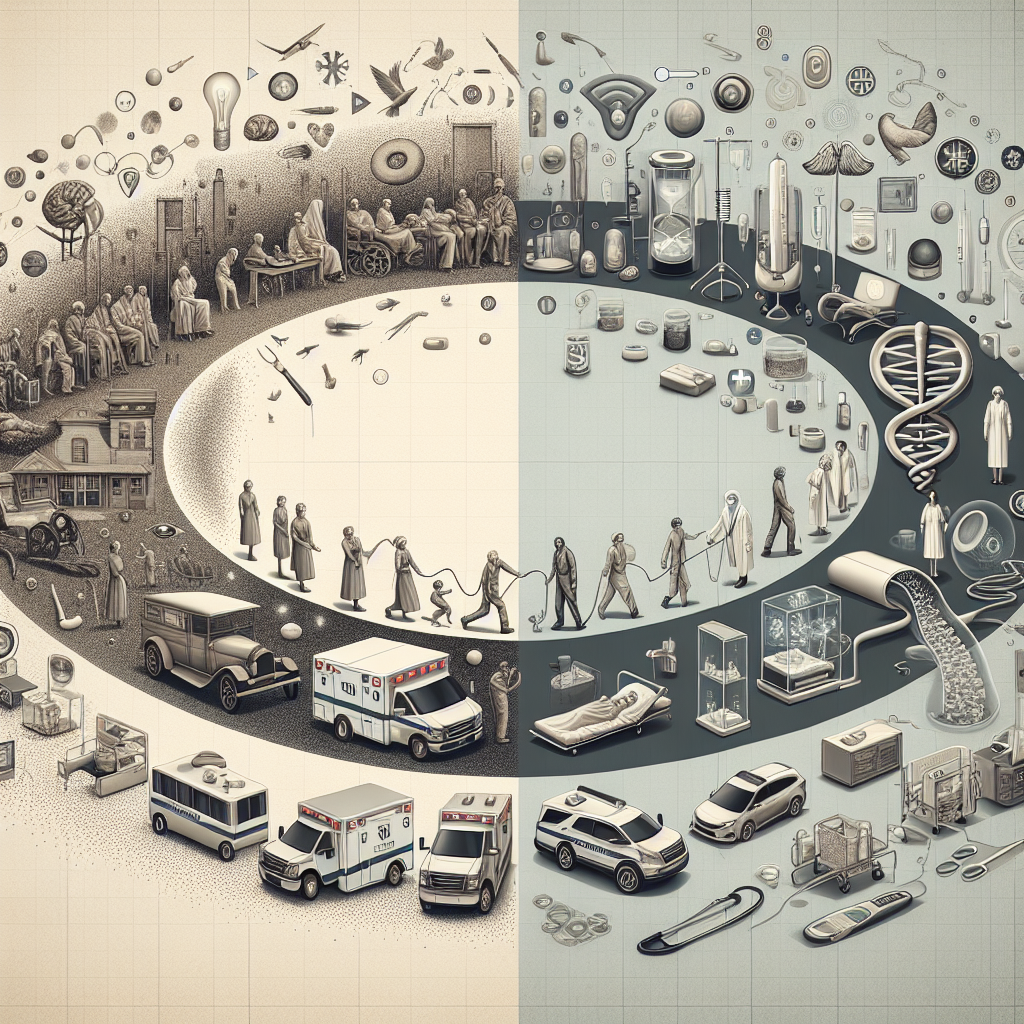The History and Future of Universal Healthcare in the U.S.

Exploring the Journey and Prospects of Universal Healthcare in the U.S.
Deeply entrenched in the fabric of American society, the discourse on universal healthcare has long been a captivating saga of aspirations, triumphs, and challenges. It's a tale that has evolved with the nation, continuously shaping and being shaped by the socio-economic and political landscape. As we delve into the history of universal healthcare in the U.S., we also gaze into the crystal ball, contemplating the intriguing possibilities that lie ahead. Join us on this enlightening exploration of the past and future of universal healthcare, an issue that continues to ignite passionate debates, inspire policy changes, and drive the quest for a healthier, more inclusive America.
Introduction to Universal Healthcare
Universal healthcare, also known as universal health coverage, is a system that provides health care and financial protection to all residents of a particular country. It is organized around providing a specified package of benefits to all members of a society with the end goal of providing financial risk protection, improved access to health services, and improved health outcomes.
The History of Universal Healthcare in the U.S.
The concept of universal healthcare is not new in the United States. In fact, it has been a topic of discussion and debate for over a century. In the early 20th century, the American Association for Labor Legislation drafted a model bill for health insurance. However, this bill was met with resistance and never passed. In the years following World War II, President Harry S. Truman proposed a universal healthcare program, but this too was met with opposition. Despite these early setbacks, the idea of universal healthcare persisted. In 1965, President Lyndon B. Johnson signed the Social Security Amendments into law, creating Medicare and Medicaid. These programs, which provide health insurance to the elderly and low-income individuals respectively, marked a significant step toward universal healthcare. In 2010, the Patient Protection and Affordable Care Act (commonly known as the ACA or Obamacare) was signed into law by President Barack Obama. The ACA expanded Medicaid eligibility, created health insurance exchanges, and prohibited insurance companies from denying coverage or charging more based on pre-existing conditions. The ACA was a significant move towards universal healthcare, yet it has also been a subject of controversy and legal challenges.
Future of Universal Healthcare in the U.S.
The future of universal healthcare in the U.S. is uncertain and highly dependent on the political climate. Some argue that the answer lies in a single-payer system, where the government would pay for all healthcare costs. Advocates for this approach point to countries like Canada and the United Kingdom, where such systems are in place. Others believe in a multi-payer system, where the costs of healthcare are shared between individuals, insurance companies, and the government. This is the model currently used in countries like Germany and Japan. There are also discussions surrounding a public option. This would allow individuals to choose between a government-run insurance plan or a private one.
Practical Examples and Insights
The U.S. Veterans Health Administration is a practical example of a single-payer system. All enrolled veterans have access to a specific set of benefits, and the government foots the bill. On the other hand, the current U.S. healthcare system, with its mix of employer-provided insurance, private insurance, and government programs like Medicare and Medicaid, is an example of a multi-payer system. In terms of insights, it's important to note that while universal healthcare aims to ensure that everyone has access to the care they need, achieving this goal is complex. It requires not just changes in how healthcare is funded, but also in how it is delivered. Regardless of the specific path the U.S. chooses, the transition towards universal healthcare will likely be a gradual process, requiring ongoing adjustments and refinements.
Use Case 1: Research Paper for Public Health Course
A university student taking a public health course may be assigned a research paper on the topic of "The History and Future of Universal Healthcare in the U.S." The assignment could require students to delve into the history of healthcare in the U.S., the political and social debates surrounding the issue, and potential future developments. The student could use this SEO content to understand the key historical events and future possibilities related to universal healthcare. They could also use it to gather statistics, quotes, and other data for their paper. It may also provide them with different perspectives on the topic, allowing them to craft a well-rounded argument in their paper.
Use Case 2: Policy Briefing for Lawmakers
A policy advisor or legislative aide could use this SEO content to prepare a briefing for lawmakers on the topic of universal healthcare. This could be particularly useful during legislative sessions when healthcare reforms are being considered. The advisor could use the content to provide an overview of the history of universal healthcare in the U.S. and outline potential future scenarios. The information in the content could help lawmakers understand the implications of various policy decisions and could inform their voting decisions.
Use Case 3: Content for Healthcare Advocacy Organizations
Healthcare advocacy organizations often need to create content to educate their members, the public, and policymakers about various healthcare issues. This SEO content on the history and future of universal healthcare in the U.S. could be used to create blog posts, social media content, newsletters, and other forms of communication. The information in the content could help these organizations articulate the need for universal healthcare and could provide them with historical context and future predictions to support their advocacy efforts. Title: The History and Future of Universal Healthcare in the U.S. Introduction Universal Healthcare has been a subject of significant debate in the United States for over a century. While many developed nations have established some form of universal health coverage, the U.S. has yet to follow suit. This discussion explores the historical context of universal healthcare in the U.S, the current landscape, and future prospects. Early History Universal Healthcare can be traced back to the early 20th century when the American Association for Labor Legislation attempted to introduce health insurance for the working class. However, the proposal was met with strong opposition from interest groups like the American Medical Association (AMA), who feared potential loss of professional autonomy. This marked the beginning of a long-standing resistance against universal health coverage. Medicare and Medicaid: A Step Towards Universal Healthcare The introduction of Medicare and Medicaid in 1965 under President Lyndon B. Johnson was a significant milestone. These programs provided healthcare coverage for senior citizens and low-income families, respectively. Despite being a significant step forward, these programs did not extend to the entire U.S population, leaving a substantial portion of Americans uninsured. Affordable Care Act (ACA): A Modern Attempt In 2010, the Obama administration passed the Affordable Care Act (ACA), commonly known as Obamacare. The ACA expanded Medicaid, created health insurance marketplaces, and implemented mandatory health insurance for all Americans. However, the implementation of the ACA has been controversial, facing legal challenges and criticisms, particularly over the individual mandate that required Americans to purchase health insurance or face a penalty. The Future of Universal Healthcare Several studies predict a dramatic shift towards universal healthcare in the future. According to a study published in the American Journal of Public Health, nearly 70% of Americans, including a majority of Republicans, support a universal healthcare system. The COVID-19 pandemic has further highlighted the need for universal healthcare, with millions of Americans losing their employer-provided health insurance due to job loss. This has led to a renewed push for a single-payer system, often referred to as "Medicare for All". However, there are concerns around the cost of implementing such a system, as well as resistance from private health insurance companies. Conclusion The history of universal healthcare in the U.S. is characterized by a series of attempts and resistance. While there is growing support for a universal healthcare system, there are significant barriers to its implementation. The future of universal healthcare in the U.S. is likely to remain a central issue in American politics, driven by public opinion, economic factors, and the evolving healthcare landscape.
1. What is the Origins of Universal Healthcare in the U.S?
The concept of universal healthcare in the U.S. originated in the early 20th century. In 1912, Theodore Roosevelt, as part of his Progressive (Bull Moose) Party platform, proposed a system of social insurance that would include health coverage. However, it wasn't until 1965 that the U.S. government introduced Medicare and Medicaid, providing healthcare for the elderly and low-income populations respectively.
2. Why has Universal Healthcare been a Contentious Issue?
Universal healthcare has been contentious mainly due to ideological differences. Some view healthcare as a basic human right, thus advocating for a universal system. Others, however, believe in a private system, arguing that competition improves quality and efficiency. The cost of implementing a universal healthcare system is also a major point of contention.
3. How has Universal Healthcare Evolved in the U.S.?
Universal healthcare has evolved significantly. From the introduction of Medicare and Medicaid in 1965, to the failed attempt at healthcare reform in 1993 during the Clinton administration, and then the passage of the Affordable Care Act (ACA) in 2010. The ACA, also known as Obamacare, sought to make healthcare more accessible and affordable for all Americans.
4. What is the Current State of Universal Healthcare in the U.S.?
As of now, the U.S. does not have a universal healthcare system. However, the ACA has expanded coverage to millions of previously uninsured Americans. Still, many remain uninsured and the cost of healthcare continues to be a major issue.
5. What is the Future of Universal Healthcare in the U.S.?
The future of universal healthcare in the U.S. is uncertain. While there is growing public support for a universal healthcare system, there is still significant political and economic opposition. The outcome will largely depend on future political and legislative developments.
6. How can the U.S. Achieve Universal Healthcare?
Achieving universal healthcare in the U.S. would require major legislative changes and a significant shift in public opinion. Likely strategies include expanding existing programs like Medicare and Medicaid, implementing a single-payer system, or creating a mix of public and private insurance options to ensure everyone has access to affordable healthcare.
In conclusion, understanding the history and future trajectory of universal healthcare in the U.S. is of paramount importance, irrespective of our professional or personal backgrounds. This is not merely a topic for those in the healthcare industry or policy-making, but is a subject that affects every American, directly or indirectly. The evolution of this system, its successes, its failures, and the potential for its future development informs us of the nation's priorities, its values, and its vision for the welfare of its citizens. As we move forward, the decisions made about universal healthcare will continue to shape not only our physical wellbeing but also our economy, our politics, and our society. Thus, staying informed and engaged with this topic is crucial for all, as we all hold a stake in the future of healthcare in America.



